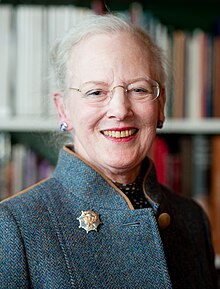Margrethe II, Queen of Denmark, announces abdication
Wednesday, January 3, 2024

Image: Johannes Jansson.
During her annual New Year's Eve address on Sunday, Margrethe II, Queen of Denmark, informed the public that she planned to step down on January 14. Crown Prince Frederik, her oldest son, is to succeed her.
She is 83 years old and has served as Queen for nearly 52 years. In her live television address, Margrethe also discussed global issues like climate change.
In Denmark, the monarch serves as head of state; the parliament is in charge of forming the government.
Margrethe received high levels of support from the Danish people, with about 80 percent of the public approving of her as of 2022. Prime Minister Mette Frederiksen expressed gratitude for the queen's decades of service on the throne, calling her the "epitome of Denmark" in a statement.
Since the death of the United Kingdom's Queen Elizabeth II, she has been the longest-reigning sitting monarch in Europe and the world's only reigning queen.
Born days after the Nazi invasion of Denmark in 1940, she ascended to the monarchy in 1972. During her childhood, the 1953 Act of Succession gave women the ability to inherit the throne, and she became the first female monarch of Denmark in over 500 years.
Since Denmark has no formal coronation ceremonies, Crown Prince Frederik is set to be proclaimed King immediately after Margrethe formally abdicates.
The queen explained that her February back operation had led her to consider moving on. "The surgery naturally gave rise to thinking about the future," she said.
During her reign, she frequently traveled around her country without formal accompaniment and visited deployed Danish soldiers in the War in Afghanistan at 70 years old. Margrethe is also known for her interest in archaeology and the arts. Under a pseudonym, she was the illustrator of a 1977 Danish-language version of The Lord of the Rings.
Sister links
Sources
- AnneClaire Stapleton. "Danish Queen Margrethe announces surprise abdication after 52 years on the throne" — CNN, December 31, 2023
- Jacqueline Howard & Oliver Slow. "Queen Margrethe II: Danish monarch announces abdication live on TV" — BBC News Online, December 31, 2023
- Jacob Gronholt-pedersen. "Denmark's Queen Margrethe II announces surprise abdication on live TV" — Reuters, December 31, 2023
- Andrea Vacchiano. "Denmark's Queen Margrethe II announces she's stepping down from throne: 'Now is the right time'" — Fox News, December 31, 2023
- Brenton Blanchet. "Queen Margrethe of Denmark Announces She Will Abdicate in January After 52 Years on Throne" — People (magazine), December 31, 2023
- "Denmark’s Queen Margrethe II marks five decades on the throne with muted celebrations" — Euronews, November 9, 2022
- Stacy Conradt. "The Time the Queen of Denmark Illustrated The Lord of the Rings" — Mental Floss, August 5, 2015
- Emily Haight. "One Queen to Rule Them All: Margrethe II of Denmark" — National Museum of Women in the Arts, February 25, 2013
External links
- Press Release: "Hendes Majestæt Dronningens nytårstale 2023 (Her Majesty The Queen's New Year's Speech 2023.)" — Monarchy of Denmark, December 31, 2023 (Danish)

